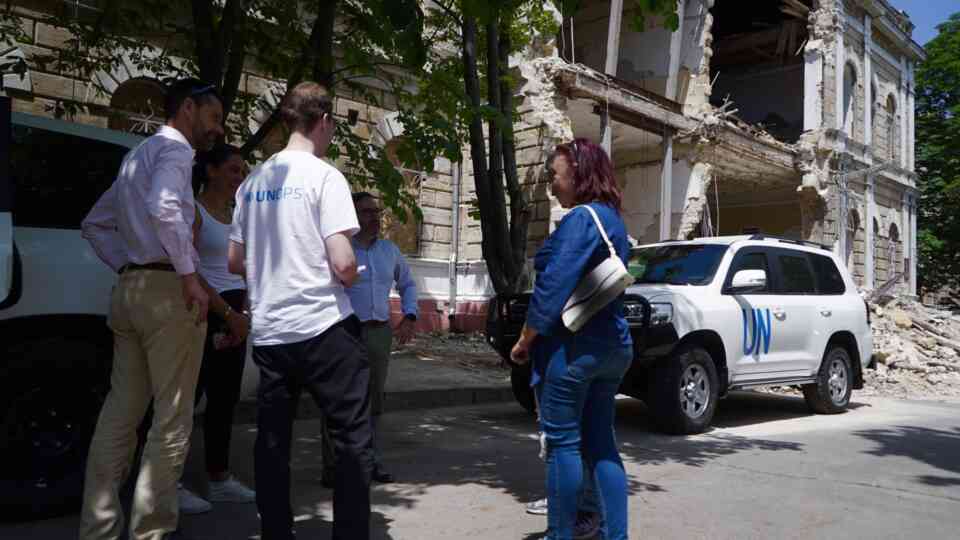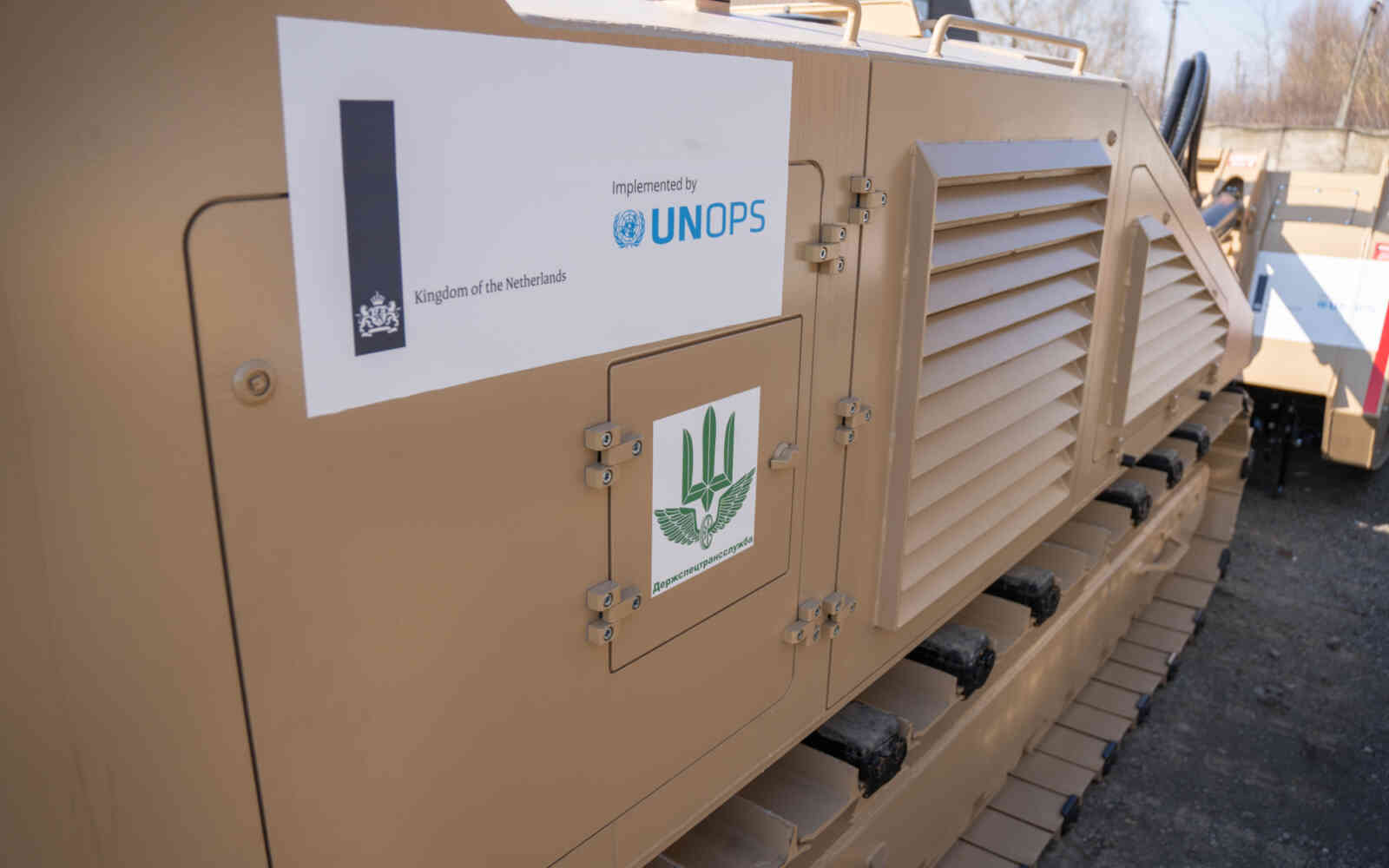The United Nations Office for Project Services (UNOPS)
From ruins to renewal: Helping Kharkiv recover
In Kharkiv, Ukraine, UNOPS and the government of Japan are working to provide hope for residents recovering from the devastation of war with critical repairs restoring safety and warmth to shattered homes.
Kharkiv, once home to 1.5 million people, lies just 35 kilometres from Ukraine’s border with Russia. In February 2022, Russian forces targeted the city as one of the first major cities in its full scale invasion. After months of relentless shelling and missile strikes that caused widespread destruction and displacement, Kharkiv’s residents finally saw some relief in the autumn of 2022. Russian troops withdrew from the city’s outskirts, and the bombardment eased.
However, nearly three years later, Kharkiv still faces constant threats. Russian drones, missiles and gliding bombs continue to target the city, often evading air defenses due to its proximity to the border. City authorities report that approximately 160,000 residents of Kharkiv have lost their homes due to damage and destruction. More than 8,300 residential buildings in the area have been affected.




In the northern Saltivka district, one of the hardest-hit areas of Kharkiv, Liudmyla Sydorenko works for the local NGO, Peaceful Heavens of Kharkiv. For the past few months, her main task has been coordinating access to people’s apartments so that workers can replace damaged windows and doors. Where necessary, they also make minor repairs to walls, floors and ceilings. This initiative is part of a project funded by the government of Japan and implemented by UNOPS.

Many people have left their homes. We put up posters around the neighbourhood with our contact details, and we talked to neighbours to reach those who are not here permanently. We found that most residents were staying with relatives elsewhere in Kharkiv and the region. Some have moved to Poltava or further in Ukraine. Some left for abroad.
“Most were pleased to learn of the works, and even if they couldn’t come in person, they found ways to arrange for the workers to enter their apartments,” shares Liudmyla.
Since 2023, UNOPS and the government of Japan have been working to restore housing in Kharkiv. The project focuses on repairing buildings that were damaged in 2022 but remain structurally sound – replacing windows and doors, and repairing roofs and facades. The goal is to provide residents with safe, habitable living spaces and help revitalize communities shattered by the war.
Liudmyla is one of several community mobilizers, acting as a vital link between the project team, local residents, and the contractors carrying out the repairs.
Speaking about the project’s impact, Liudmyla points out the psychological aspect of support coming from outside: “This help is crucial because people have started losing hope. Their homes are everything to them. They’ve invested years of their lives into these apartments, so losing them is unimaginable. The fact that Japan is providing this kind of assistance means the world to us here in Kharkiv, and it’s a great example for others to follow.”
I want to do well by the people. I can really put myself into people's shoes: my apartment was damaged, too, so I know what it feels like.

The project has facilitated repairs in 13 residential buildings, covering more than 800 individual apartments, along with entrances, facades, common areas, and roofs. As winter approaches, over 3,500 residents will be able to enjoy restored living spaces.
“The repairs are modest, but functionally critical,” explains Valentyn Siekachov, A civil engineer working for UNOPS in Kharkiv. “We have focused on ensuring that people’s living spaces are warm and properly protected from the elements. One of our priorities has been maximizing the impact of the funds entrusted to us by the government of Japan, and reaching as many people as possible.”
Liudmyla admits that the work done represents a tiny portion of what is needed to bring Kharkiv to its former glory. Still, she believes every step is crucial.
“There is so much we have to do, and so much we want to achieve,” she stresses. “I’d love our children to be able to enjoy the festivities[…]and it would be lovely to see football matches played at the city stadium. Kharkiv’s recovery is a long path, and there is no such thing as larger or smaller steps as we go along. Every little change matters.”
As this project comes to an end, it leaves behind a legacy that can serve Kharkiv for years to come. UNOPS civil engineers Valentyn Siekachov and Andrii Istomin, who were heavily involved in designing and supervising the project’s technical solutions, point out that some of the approaches have the potential to be used as standard when renovating residential buildings.

We tackled renovations in buildings that are typical for Kharkiv’s residential areas. The city has thousands of apartment blocks like this, and what we’ve done with entrances and roofs could easily be replicated elsewhere.
“We’ve also left our mark through our cooperation with local construction companies, our contractors. When it comes to health and safety and international standards for handling hazardous materials, I think working with us has been an educational experience for them. They’ll be better positioned to take on these tasks in the future,” adds Andrii.
The project was carried out in a highly challenging environment, and the work was far from easy.
“Managing expectations has been really difficult. The project did not address beautification and cosmetic issues, focusing on functional interventions instead,” explains Liudmyla. “We’ve experienced schedule slippage in some places, continuous power outages have not been helpful. But those things are just what you would expect in this context.”
Liudmyla views some of the work of the project in an apartment receiving repairs.

Liudmyla is hoping that support for Kharkiv will continue, and more people will be able to benefit from repairs.
“I know some people believe now is not the time for this kind of restoration,” she says, referring to calls to postpone recovery work until the conflict is over. “I disagree. People living in Kharkiv and other places close to the frontline deserve a decent life, and it starts with a safe home. I really hope this sort of help continues and grows, and we will see Kharkiv flourish again.”
About this project
The primary focus of this initiative is to repair and revitalize multi-apartment buildings in Kharkiv’s Kyivskyi and Shevchenkivskyi districts, which have suffered extensive damage due to ongoing shelling and missile attacks. These repairs are crucial for providing safe, warm and secure homes for thousands of residents before the harsh winter fully sets in. The project includes the restoration of 13 buildings, focusing on the repair of windows, walls, and utility systems.
















